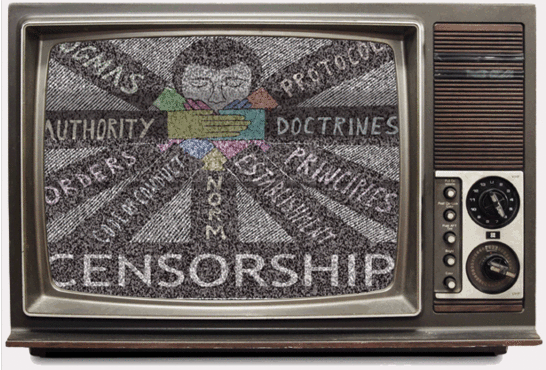Creative Project – Macy Harrell
Artist Statement – Macy Harrell
Love, Hate & Censorship (2014)
After carefully considering cultural universals such as love, hate, currency, and food; censorship made my list. This piece addresses censorship laws around the globe. This theme is significant and timely. Art and expression is universal, and with that universal liberty we also are met with censorship. This gif is comprised of 85 separate images framed within a vintage television set. I chose a TV set for its traditional nature in conveying information to the masses. Using a medium as contemporary as a gif is an ode to the development of digital art and everyone’s easy access to it.
Most of the images in this gif are either censored works or their creators. It features the banned cinematic work of Iranian director Jafar Panahi, Chinese director Chen Kaige, American director Seth Rogan, Russian director Sergei Eisenstein, American Gary Ross, American screenwriter James W. Horne among a few others. Titles include “The Interview (2014)” “The Mirror (1997),” “Farewell My Concubine (1993).” All the cinematic works featured in this gif have been banned in some part of the world.
Cinema is not the only creative medium plagued with censorship laws and limitations. News and art are also marginalized. To emphasize that, I included the banned album artwork of Kanye Wests’ “My Beautiful Dark Twisted Fantasy (2010),” Tracey Emin’s contemporary Sarah Lucas image of a Christ made of cigarette buds being crucified on the cross of the English flag. Images of journalists that have either been murdered, jailed, blackmailed for expressing truths to the public are also featured (Georgiy Gongadze – Ukraine, Mohamed Sokrate – Morocco, Walgney Assis Carvalho – Brazil). I strategically selected artist and public figures from opposite sides of the world to emphasize the universality of censorship.
This gif is quite literally a referential work of artistic appropriation greatly inspired by Soda_Jerks 2006 film ”Hollywood Burn.” In the Mckenzie Wark reading we are reminded that “What digital technology makes possible is a vast outpouring of the gift.” This gif and “Hollywood Burn” are testaments to this statement. Because consistency is seemingly absent, the viewer’s viewers mind is never at ease. Despite its wacky design, these works are challenging in that they demand a rich understanding of pop culture, and patience to consume all the messages.
The Yochai Benkler’s discourse “The Political Economy of Commons” encompasses the message of this work perfectly when he says “The ability to control who gets to say what to whom with the core cultural signifiers of our time.” The global stipulations bestowed upon artists are usually perceived as hindrances in the creative process, but some of the greatest works in cinema I’ve see make subtle political statements. Many artists still manage to flourish artistically. In Thomas Y Levins “Rhetoric of the Temporal Index: Surveillant Narration and the Cinema” he says “surveillance has become the condition of narration itself.” Levins is addressing a larger theme of this project: surveillance.
